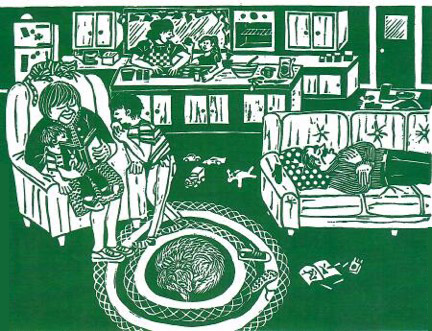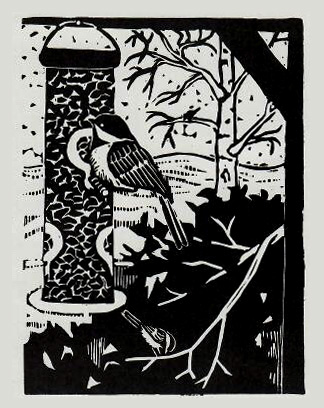A Blog of Flashbacks Lane’s End
June 2023
Judy and I had several things in common—relatives, love of adventure, being involved in the arts, Quakers, Alaska, living in the small town of Gustavus, Alaska, and getting together three or four times a week for cheese and tea. She did fine drawings, paintings, and linoleum block prints, which she sold. I am a published poet, novelist, and nonfiction writer. We talked about our adventures, assumed one another’s creativity, and appreciated living here with the fun of having a relative around. Towards the end of her life, we talked a lot about family since her cousin, Hugh, became my brother-in-law when we were both teenagers. Further, our two families had known one another since before Judy and I were born. Hugh and his family lived a mile from us in a house called Lane’s End at the end of Singletary Lane in Framingham Centre, Massachusetts. She remembered the third floor as filled with Hugh and his brother Jack’s collection of thousands of comic books. I think of the house for its swimming pool and formal rose garden. Now I think about the name of that house: Judy has reached her own lane’s end.
 |
Holiday Pursuits by Judy Cooper
I always told Judy this card was a Folsom Thanksgiving dinner in Mary and Hugh Folsom’s family kitchen, not in the Windham Hill Inn kitchen. Mary and Hugh owned and ran the Inn from its opening in 1961 till they sold in 1980. Hugh (with moustache) is napping on the sofa while Mary and Cathy fix something. Gaga Folsom, Hugh’s mother, or Gummy Calkin, Mary’s mother, reads to Hubey and Elizabeth. Judy always smiled when I told her that. |
Hugh and my oldest sister, Mary, went to first grade together. In their prep school years, Mary and Hugh ran in the same crowd. And dated. One afternoon, Hugh drove up to our house in a light blue convertible. His brother, Jack, rode shotgun. Their little sister, Peggy F, had the back seat all to herself. On this lovely summer day, they had the top and all the windows down.
My friend from infancy lived a five-minute walk from me. Peggy W—we knew one another before we knew we knew one another—and I awaited the arrival of Hugh and Jack’s little sister, Peggy. We were concerned because we knew Peggy F. was blind and feared she’d want to stay in the house and play dolls. Friend Peggy had one doll and I had one doll. You might find us in the house playing cards or reading books, but our favorite activities included climbing trees, riding our bikes near and too far from home, picnicking on cool tombstones in the hot summer days, or walking down the hill behind her house to watch the troop and freight trains go by. We were four-and five-year-old adventurers. Oh dear. Were we really going to have to sit in the house and play dolls with this new Peggy? Not a chance.
Hugh pulled alongside the curb and out from the backseat came Peggy. She leapt over the side, easier than opening the door. She had a stick in her hand and immediately ran around my front yard, full of huge 100-year-old trees, waving the stick and hollering, “Let’s play cowboys and Indians!” That was not a game Peggy and I played, but we took one look at each another and silently said, “All right! We can handle playing with this new Peggy! She’s our kind.” We adventured from the front yard to the back yard and the hills of the side yards as the three of us ran around. Our only care was to have fun.
It turns out that Judy and I were also cut of the same cloth as her cousin, Peggy. We were "I’ll do what I want; thank you very much” children and adults.
Advance fifteen or so years later after the two Peggys and I ran around my huge yard when Mary and Hugh married. Hugh, Mary, and I, like cousin Judy, always remained adventuresome souls. Sweet, gentle, kind, and loving to laugh, Judy and I referred to one another as what we were—cousins-in-law. That was much easier than going into the details of in-law relationships.
When Judy moved back to Southeast Alaska from Fairbanks and Two Rivers, she decided on Gustavus for herself and the sixteen or so sled dogs she still owned. She needed someone to build her house. My son is a building contractor. One day as he built and she stood by, Seth announced,
“You know my Uncle Hugh, Hugh Folsom.”
Surprised, she said, “Yes, he’s my cousin.”
“He’s my Uncle Hugh,” he said again.
After more conversation, Seth returned to pounding nails.
As the years progressed, Judy and I both were guests at Seth and his family’s dinner table and all of them at my husband’s and my table. My grandchildren, young as they were then, still remember her for her dogs and the family gatherings.
Seth knew her artwork for he’d spent a summer in Vermont with his Aunt Mary and Uncle Hugh. Every time Hugh and Mary received a card from Judy, Mary taped it to the half-wall going down the stairs from the living room to the kitchen. There must have been 50 of them on that wall. After Hugh and Mary died, their two daughters, granddaughter, and I went to Vermont to empty the house, feeling Judy’s presence that we all knew. We were so busy, I didn’t take the time to sit on the stairway, look at the cards and select five to frame for Judy and five to frame for myself. There was something special about having passed them for years and looking at their images, stains, and bent or torn corners. We left them there.
We also knew of her travels, work, and escapades from two years of Peace Corps work in Bolivia, then to work in North Carolina, to her arrival in Hoonah, Alaska in 1968. After that, she never left the North—Hoonah to Juneau to Tagish, Yukon, to Fairbanks to Two Rivers, Alaska.
She mushed her dogs, bred them, skijored with them, ran them pulling a road cart in summers. She drew, made block prints some of which are in books, prints, and greeting cards. By the time she died, less than two weeks ago, she had a fine reputation across Alaska. It was not uncommon to have someone say, “You know THE Judy Cooper?”
Judy read voraciously. She bicycled in Russia. She was active in politics, read newspapers and listened to NPR and classical music daily. Her friendships were broad and varied. She contributed to Native American and Peruvian schools and cultures. She came to visit my husband’s and my house two or three times a week, always with a chunk of cheese, preferably from Wisconsin and usually often filled with blueberries or cranberries. Once as a child she ate so many blueberries while picking them, she became ill.
Her Uncle Howard and one of his sons, Tom, owned a cranberry farm. She often came by, especially for any dinner, with a bowl of cranberry sauce.
Her niece, Alicia, her cousin’s (Hugh) and my sister’s (Mary) granddaughter, Haley, who thought she was coming for a vacation next week, arrive Friday. I called Haley to tell her plans had changed and she was helping empty Judy’s house along with one of Judy’s nieces. Haley knows how to do this. At age 14, she, her mother, aunt, and I emptied their parents four-bedroom, two living room, den, TV room, pantry larger than most peoples’ kitchens, the kitchen, and sunroom in eight days, shipping family things to five different locations across the country. When I called to tell her of the change in plans, she said we’ll take all the personal papers to my house and sort them there. Alicia is an artist in her own right. I have one of her books next to me on a footstool in my study.
I just looked at Facebook again and the wonderful mass of comments from the mass of Judy’s friends. Judy has reached the end of the lane. I hold you in the Light, dear friend and relative.
 |
Black Capped Chickadee by Judy Cooper |

|
